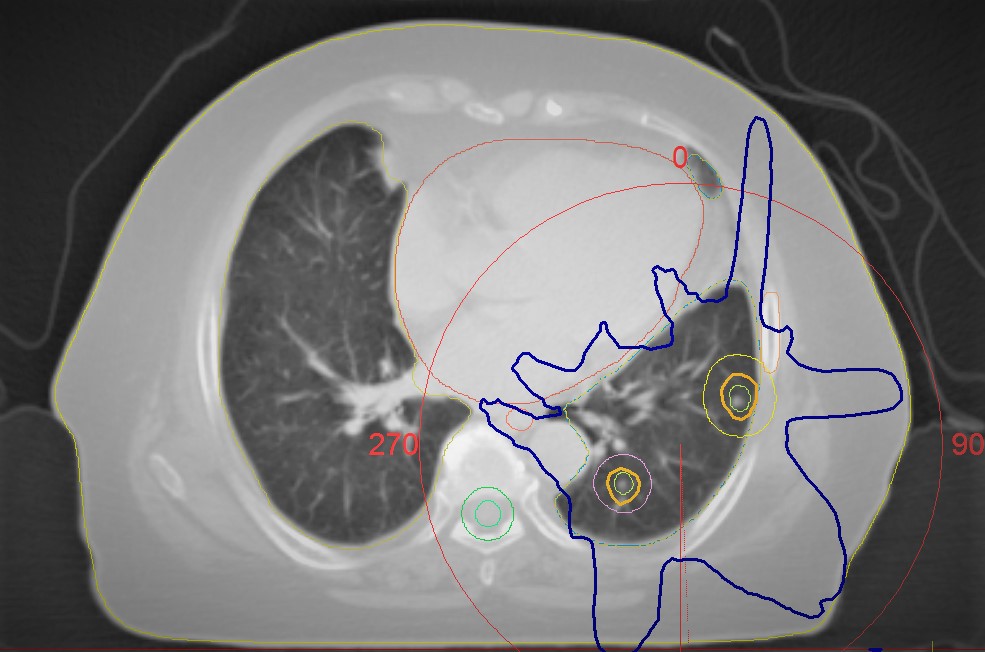글로벌 연구동향
방사선종양학
- [Jpn J Clin Oncol.] Stereotactic ablative radiotherapy for pulmonary oligometastases from primary hepatocellular carcinoma: a multicenter and retrospective analysis (KROG 17-08)
가톨릭의대 / 조인영, 이종훈*
- 출처
- Jpn J Clin Oncol.
- 등재일
- 2022 May 31
- 저널이슈번호
- 52(6):616-622. doi: 10.1093/jjco/hyac028.
- 내용
Abstract
Objective: Hypofractionated radiotherapy has recently been applied to treat pulmonary metastases of hepatocellular carcinoma. However, there is no definite evidence on its safety and efficacy. We evaluate the clinical outcomes of hypofractionated radiotherapy for oligo pulmonary metastases of hepatocellular carcinoma in the multicenter and retrospective study.Methods: From March 2011 to February 2018, 58 patients with fewer than five pulmonary metastases of hepatocellular carcinoma who underwent hypofractionated radiotherapy in nine tertiary university hospitals were analyzed retrospectively. The primary endpoint was the local control rate. The secondary endpoints were overall survival, progression-free survival, prognostic factors affecting the treatment outcomes and treatment-related side effects.
Results: The local tumor response rate including complete and partial response was 77.6% at 3 months after hypofractionated radiotherapy. The median survival and progression-free survival times were 20.9 and 5.3 months, respectively. The 1-year overall survival and progression-free survival rates were 65.5 and 22.4%, respectively. The good treatment response after hypofractionated radiotherapy (P = 0.001), the absence of intrahepatic tumor (P = 0.004) and Child-Pugh class A (P = 0.010) were revealed as significant prognostic factors for overall survival in the multivariate analysis. A progression-free interval of <6 months (P = 0.009) was a negative prognostic factor for overall survival in the multivariate analysis. Of 58 patients, five (8.6%) had grade 2 or higher radiation pneumonitis after hypofractionated radiotherapy.
Conclusions: The favorable local control rate and acceptable toxicity indicate the clinical usefulness of hypofractionated radiotherapy for hepatocellular carcinoma patients who have less than five pulmonary metastases.

Affiliations
In Young Jo 1 , Hee Chul Park 2 , Eun Seog Kim 1 , Seung-Gu Yeo 3 , Myungsoo Kim 4 , Jinsil Seong 5 , Jun Won Kim 5 , Tae Hyun Kim 6 , Won Sup Yoon 7 , Bae Kwon Jeong 8 , Sung Hwan Kim 9 , Jong Hoon Lee 9
1 Department of Radiation Oncology, Soonchunhyang University Hospital, Cheonan, Republic of Korea.
2 Department of Radiation Oncology, Samsung Medical Center, Sungkyunkwan University School of Medicine, Seoul, Republic of Korea.
3 Department of Radiation Oncology, Soonchunhyang University Hospital, Bucheon, Republic of Korea.
4 Department of Radiation Oncology, St. Mary Hospital, Incheon, Republic of Korea.
5 Department of Radiation Oncology, Yonsei University College of Medicine, Seoul, Republic of Korea.
6 Research Institute and Hospital, National Cancer Center, Goyang, Republic of Korea.
7 Department of Radiation Oncology, Korea University College of Medicine, Ansan, Republic of Korea.
8 Department of Radiation Oncology, Gyeongsang National University School of medicine and Gyeongsang National University Hospital, Jinju, Republic of Korea.
9 Department of Radiation Oncology, St. Vincent's Hospital, The Catholic University of Korea, Seoul, Republic of Korea.
- 키워드
- hepatocellular carcinoma; pulmonary metastasis; radiotherapy; response.
- 연구소개
- 최근 주목받고 있는 간세포암의 소수성 폐전이에 대한 저분할방사선치료의 치료 성적에 관한 논문입니다. 간세포암의 소수성 폐전이암의 경우, 적절한 치료를 통해 환자의 생존율을 높일 수 있기 때문에 치료 결과를 극대화하기 위해 치료과정을 제대로 완료하는 것이 중요합니다. 간세포암의 소수성 폐전이 치료에 있어 기존의 항암치료 및 수술적 제거 방법이 있으나, 환자의 전신 상태나 기저질환에 따라 적용되지 못하는 경우도 많고 치료 과정에서 나타나는 부작용으로 치료를 완료하지 못하는 경우도 많습니다. 이는 환자의 예후를 저하시키는 요인이 될 수 있습니다. 본 연구에서는 저분할방사선치료가 소수성 폐전이를 가진 간세포암 환자에서 적은 부작용으로 기존의 항암 및 수술 치료 성적과 유사한 치료 결과를 보임을 알 수 있었습니다. 동시에 거의 100%에 달하는 치료 완료율을 보였습니다. 따라서, 간세포암의 소수성 폐전이 환자의 까다로운 치료에 있어, 저분할방사선치료는 새로운 대안이 될 수 있음을 보여주는 좋은 연구라고 생각합니다.
- 덧글달기









